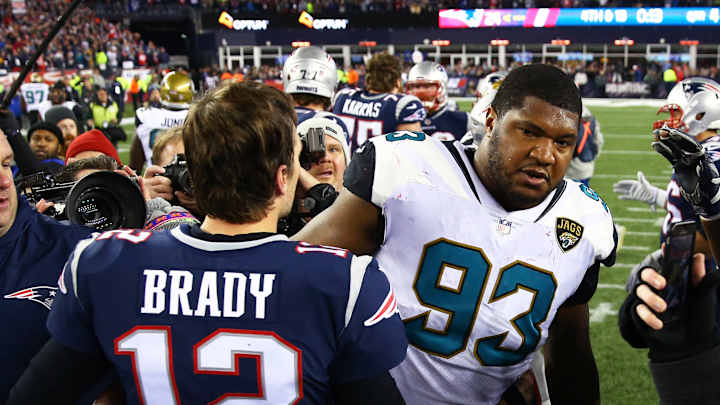Calais Campbell Gives His Own Explanation for How the Jaguars’ 2017 Season Ended

When the Jacksonville Jaguars agreed to trade cornerback A.J. Bouye to the Denver Broncos in exchange for a fourth-round pick in the 2020 NFL Draft, it signaled the Jaguars straying even further from their historic 2017 season.
Stars of that team such as Bouye, Jalen Ramsey, Malik Jackson, and Telvin Smith are all gone, with other key contributors like Tashaun Gipson, Marcell Dareus, Aaron Colvin, Barry Church, Pual Posluszny, Dante Fowler, and eventually Yannick Ngakoue, joining them.
But despite this wealth of defensive talent forming an elite unit and going 10-6 in 2017 en route to an appearance in the AFC Championship, the Jaguars failed to defeat the New England Patriots and advance to the first Super Bowl in franchise history.
Why not? Defensive lineman Calais Campbell, one of the last players left from that defense who is still in Jacksonville, had his own theory on Twitter.
"Myles Jack was not down!!! #JustSaying ," Campbell tweeted on Friday night.
Myles Jack was not down!!! #JustSaying
— Calais Campbell (@CalaisCampbell) March 6, 2020
Campbell is, of course, referring to a play from the 24-20 loss to the Patriots in the AFC Championship game that has become a painful part of Jaguars' history. When people look back on the 2017 Jaguars and wonder what happened that held them back from reaching the pinnacle of the football world, the one play that always comes to mind is linebacker Myles Jack's almost game-changing fumble recovery.
Amazing play by the Patriots but Myles Jack just rips the ball from Dion Lewis pic.twitter.com/3zuXdVImGR
— Eric Rosenthal (@ericsports) January 21, 2018
With 13:53 left in the fourth quarter and Jacksonville leading New England 20-10, the Patriots pulled out a trick play to try to create some offense. Tom Brady threw a pass to wide receiver Danny Amendola behind the line of scrimmage, and Amendola then heaved the ball to the other sideline to set up a screen for running back Dion Lewis.
Lewis caught the pass and had blockers in front of him. It looked like it was about to be a major gain and momentum shift for the Patriots until Jack sprinted to the ball, tackled Lewis from behind, and forced and recovered a fumble.
Jack got up to run with the ball. With few Patriots in front of him and a legion of Jaguars ready to pave his way, he could have walked into the end zone and made the score 27-10.
Instead, Jack was ruled down by officials and the whistle was prematurely blown as he began to run. The Jaguars got the turnover, but the potential game-changing touchdown was impossible to score due to the down ruling.
Jacksonville then went three-and-out on the following offensive possession, and the Patriots scored on an eight-play, 85-yard touchdown drive when they got the ball back. Momentum went to New England and it never left again.
New England would score once more with a little over two minutes left, making the score 24-20 in the Patriots' favor. The Jaguars would lose in heartbreaking fashion, and the play in which Jack was ruled down has lived in the minds of the team's players, coaches, executives, and fans ever since.
Since the "Myles Jack wasn't down" play, the Jaguars have gone 11-21 and there has been a mass exodus of talent from Jacksonville. Would things have been different if he wasn't ruled down and was allowed to advance the fumble? Would Jacksonville have defeated the Philadelphia Eagles in the Super Bowl?
These are questions that can never be answered. All that can be answered is the reply given to those who ask why the Jaguars' elite defense couldn't advance to the Super Bowl. Campbell has his theory, and it is one that is widely shared.

John Shipley has been covering the Jacksonville Jaguars as a beat reporter and publisher of Jaguar Report since 2019. Previously, he covered UCF's undefeated season as a beat reporter for NSM.Today, covered high school prep sports in Central Florida, and covered local sports and news for the Palatka Daily News. Follow John Shipley on Twitter at @_john_shipley.
Follow _john_shipley